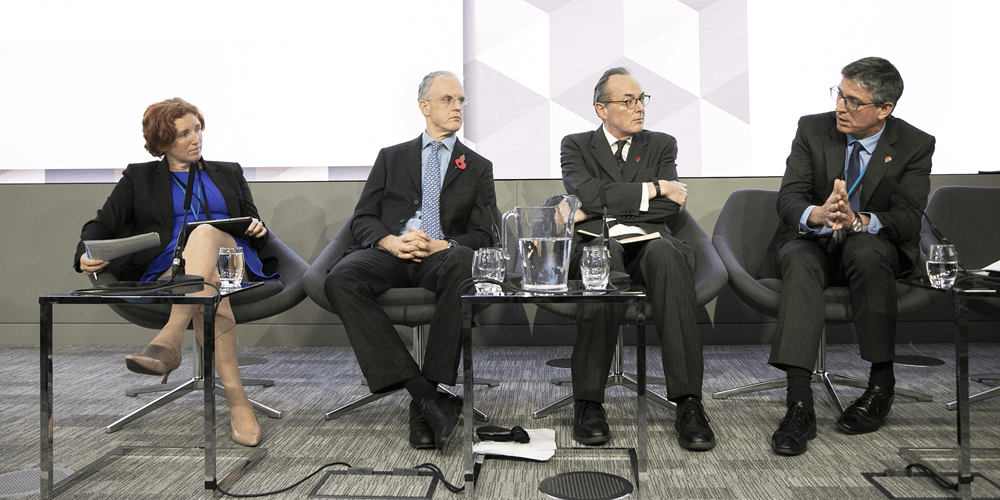
The pressure to integrate climate change thinking into LGPS asset management is growing. At the Room 151 LGPS Asset Allocation Forum, experts insisted climate be seen as a strategic issue that could change everything.
If LGPS insiders were in any doubt about the significance of climate change on investment options in the coming years, delegates to Room151’s recent gathering for pension fund managers were left with no such uncertainty.
Attendees at the LGPS Asset Allocation Forum in November were confronted with the sheer volume of government and regulatory activity aimed at climate change and responsible investment.
But also the pressing need to integrate climate concerns in their investment strategies.
REGISTER for Room151’s free LGPS Quarterly Briefing
Indeed, the audience heard that efforts to counter global warming could even upend investment activity and the key concepts it has used so far.
According to James Bevan, chief investment officer at CCLA: “We are now at yet another policy watershed and we are about to see a real shift in legislation, regulation and policy action that will put climate at the centre of everything that goes on.”
An avalanche of climate-related policy action has either descended on the investment community, or is about to:
- The Pensions Regulator mentions climate 22 times in its administration guide to DC planning;
- The Department for Work and Pensions has integrated ESG (environmental, social and governance) criteria into its core principles;
- The Financial Conduct Authority and the Prudential Regulation Authority are working on guidelines for using recommendations from the Task Force for Climate-related Financial Disclosures (TCFD);
- The government wants all asset owners to disclose their climate risk by 2020;
- LGPS investment regulations make extensive reference to environmental, social and governance issues.
Looming over all of that is the Paris agreement to limit warming to 2 degrees celcius above pre-dindustrial levels and a government target for the UK to reach net zero carbon emissions by 2050.
The United Nations’ COP26 climate summit will take place in Glasgow next year, no doubt prompting more action.
“Climate change is scary,” said Ian Simm, chief executive of Impax Asset Management.
“In the near term, we’re likely to see many more individual extreme weather events.
“Further out, all sorts of calamities are possible from real problems with plagues and infestations—damaging the agricultural system—though to mass migration. It’s something we should be really worried about.”
Analysis, management, communication
But how to manage LGPS allocations at a time in which investment is seen as a major front in the battle against an increase in global warming? Simm captured his approach in three words: analysis, management and communication.
It’s no longer enough, he said, to rely only on questions to asset managers.
According to Simm, it’s now substantive anlysis and quantitative data that is needed because the investment industry is already awash with qualitative information.
The Environment Agency and Brunel Pensions Partnership have already broken ground in developing analytical tools and others are following their lead.
“Analysis has to be done not just at mandate level, but at a fund level looking for correlations and systemic risks,” Simm said.
When it comes to looking for correlations he offered a warning.
Because of the abundance of “interlinking factors” care should be taken to avoid building system risk into portfolios.
Management also needs to respond and should be “dynamic”, according to Simm.
“This is a rapidly evolving issue. You need to stay abreast of changing information and have processes in place—semi-annual or quarterly review meetings, for example—to systematically work through changes.”
Lastly, extensive communication is required throughout a fund to educate managers, members and trustees on the key climate-related issues.
Communicating with central government will also be important for developing policies to mitigate rising temperatures.
“As soon as we get carbon price trajectories, or roadmaps for sector reform, we can start to collapse uncertainty around risk pricing; that will reduce the cost of capital for new industries,” said Simm.
“Out of the game”
As useful as that insight may be, Bevan provided LGPS managers with an emphatic warning.
The framework for thinking about asset allocation may have to change because climate change challenges “conventional wisdom” in the same way as the financial crisis.
According to Bevan, though the current asset management “world” relies on theoretical assumptions, such as mean reversion and the use of diversification resulting from correlation analysis, this is problematic.
“This is a world,” said Bevan, “where if things go wrong, you stay in the game and you have another opportunity to get back up.
Climate change isn’t like that. Climate change risks taking us out of the game completely.”
Bevan warned against assets at physical risk from climate change — “they have no place in a portfolio that is well structured”— and counselled careful thought about transition risks.
But he highlighted infrastructure, solar technology, agriculture, forestry and climate-resilient biogens as sectors with potential for investment.
“This is about sustainable investing across the asset classes. This is about recognising sustainability is about the augmentation of long-term value…,” said Bevan.
One feature of evolving asset allocation thought is that asset owners and managers may have to shift their thinking away from traditional asset classes to focus more on sectors.
And even then, some sectors will fare well while others are already suffering.
According to Seb Beloe, head of research at Wheb Asset Management, a specialist in sustainable investing, one such example is European utilities, having lost $150bn worth of value in write downs.
Germany’s RWE is a case in point. The company’s share price has declined 90% from January 2008 to September 2015.
The response by many companies in these sectors is a rush to restructure. This may include spinning off the climate-focused part of a business, or selling off the old tech to focus on new developments.
Examples include the Danish oil and gas company Orsted, which off loaded fossil fuel interests to focus on wind energy. Or Aptiv, the electric powertrain business spun out of auto supplier Delphi.
According to Beloe, many other sectors, whether “construction, consumer electronics, apparel, or food”, could suffer their own version of these traumas.
More broadly, Beloe was anxious about asset owners who might still view climate-related investing as “tactical”.
“This approach has to change,” Beloe cautioned. “Climate change specifically, and sustainability more broadly, should be considered strategic, and asset owners should seek to allocate specifically to strategies that seek to navigate these pressures, and are specifically aligned with a two degree world.
“This should no longer be considered a tactical decision made by the asset managers.”
The Room151 Weekly Newsletter covers local government treasury and pension investment, funding, development, resources and technical finance. Register here.
The LGPS Quarterly Briefing focuses purely on pension fund investment. Register here.











